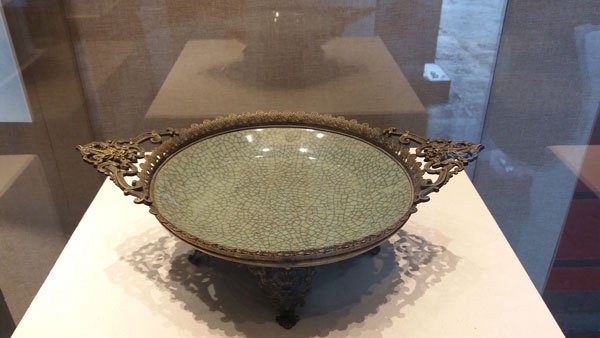
On Sept 28, Fei Yuliang arrived at Beihai Park, an ancient royal garden in Beijing, with joy.
About 60 pieces of Chinese porcelain that he'd collected over the past three decades in the Netherlands were being exhibited there.
The ongoing display, which runs through Sunday, shows porcelain bowls, vases and other wares from the Ming (1368-1644) and Qing (1644-1911) dynasties that had once been exported.
Their designs, vibrant colors and artisanship fascinate visitors.
International audiences are familiar with Chinese porcelain.
Chinese porcelain was exported to Europe via such trade routes as the ancient Silk Road centuries ago.
Back then, Chinese porcelain exports were regarded as luxury items by well-established families. The items were usually customized and made exclusively for export to Europe and later North America. So, foreign merchants usually traveled thousands of miles to buy them from China.
Unlike many antique collectors who possess a business background, Fei started his career as a Chinese martial artist.
He started learning kung fu at age 5. He won a championship in Jiangsu province at 13. By 22, he had a good hold on both Shaolin kung fu and tai chi. In 1985, he decided to continue his profession in Europe.
But starting a new life in a foreign country turned out much harder than he had thought. When he first arrived in Rotterdam, Fei had to learn Dutch from scratch to blend in.
Fei opened the first Chinese kung fu academy in the Netherlands in 1988.
In 1996, when martial arts was listed as one of the national sports in that country, he was appointed the head coach of the national team. His son, Fei Baoxian, has won three gold medals in world wushu championships.
Fei Yuliang developed the hobby of collecting antiques while teaching kung fu in the Netherlands about 30 years ago.
The first antique he bought was a pi xiu, one of the four mythical creatures in ancient China, including the dragon and phoenix, which delighted him.
Fei Yuliang sees the connections between traditional Chinese martial arts and collecting antiques.
"Collecting Chinese antiques is about traditional culture. So is traditional martial arts," he says.
Experienced kung fu practitioners have a good understanding of aesthetics, which makes them fast learners in collecting antiques, he explains.
"Kung fu is an art of the physique," he says. "A good antique also usually possesses a beautiful shape."
Fei Yuliang's collections include porcelain products, Buddha figures, jade and Chinese calligraphy and paintings.
"You are always dazzled by antiques at overseas auction houses," he says.
"When an opportunity presents itself, you seize it. Most pieces back then were genuine."
Fei Yuliang began to introduce his private collections to the public at the encouragement of a friend. He has been bringing his collections to China for display since 2009.
"I put several antiques in my suitcase when I visit," he says.
Fei Yuliang also asks his family members and students to bring antiques back to China when they return. China Customs welcomes overseas antiques home, he says.
In recent years, Fei Yuliang has been working on building a museum to exhibit his collections in his hometown, Yixing, Jiangsu province, which is home to purple-clay pottery and famous painters.
"Yixing is a city with rich culture and history," he says.
Fei Yuliang hopes such exhibitions can help people better understand culture and history.
If you go
9 am-6 pm, through Sunday. 1 Wenjin Street, Xicheng district, Beijing. 010-6403-3225.



